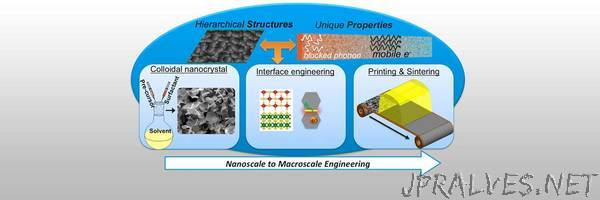
“Nanomaterials have been widely studied and proven to have unique properties that make them more suited to a variety of applications. However, there is still a need to better understand their structure and property evolutions from nanoscale to macroscale as well as transform nanoscale materials into functional devices using scalable and low-cost manufacturing processes Yanliang Zhang, assistant professor of aerospace and mechanical engineering and participating faculty member in the Center for Nano Science and Technology and the Center for Sustainable Energy at the University of Notre Dame, is working to do both. He and his team in the Advanced Manufacturing and Energy Lab are developing an innovative and highly scalable additive manufacturing process that may hold the key to transform the nanomaterials into multifunctional devices. Their work aims to fabricate high-performance and flexible energy harvesters, sensors and electronic devices, an area that is undergoing tremendous growth.
Zhang and his team are focusing their efforts on two projects in particular, one funded through a National Science Foundation (NSF) CAREER Development Award and one funded through the U.S. Department of Energy (DOE) — both targeting additive manufacturing to convert colloidal nanocrystals into functional devices of unprecedented performances.
Through the NSF project, they will be studying the additive printing and sintering processes of colloidal nanocrystals to control thermoelectric and electronic properties in printed structures. They are working to establish a scalable and cost-effective additive manufacturing process to fabricate flexible thermoelectric and electronic films. These films offer a range of applications from energy harvesting and cooling to flexible electronics and devices. The fundamental research outcomes they develop will not only significantly advance the manufacturing processes for flexible thermoelectric and electronic materials but also generate new knowledge of processing-structure-property relationships in the additive printing of a variety of functional colloidal nanocrystals.
Zhang’s team is also developing advanced 3D conformal sensors using additive manufacturing through a DOE project. The goal of the project is to develop an additive manufacturing approach to directly print sensors onto nuclear fuel components and measure the thermal conductivity. Thermal conductivity is one of the most important nuclear fuel properties driving the heat transfer performance. Printing the sensors directly onto components enables high measurement accuracy with minimal intrusion. This research has the potential to establish a new sensor manufacturing paradigm for a broad range of industrial applications.”
